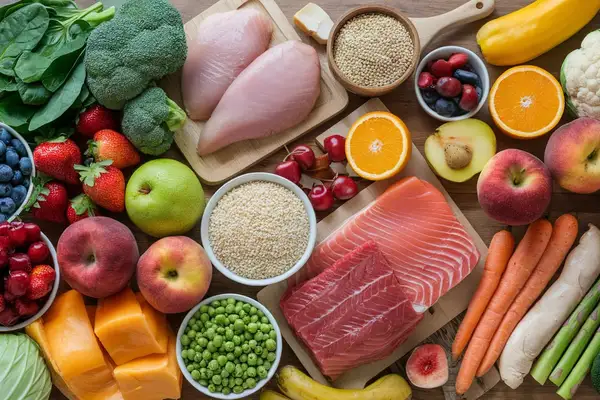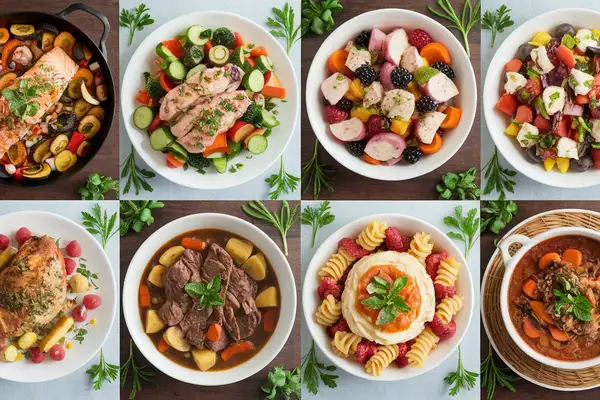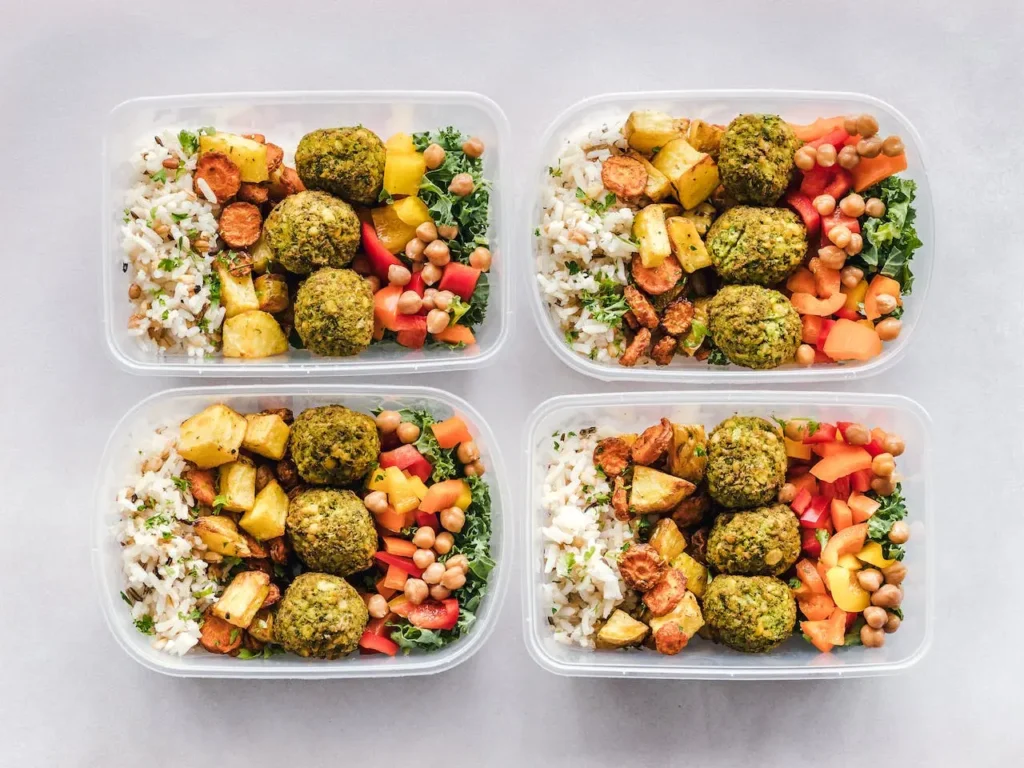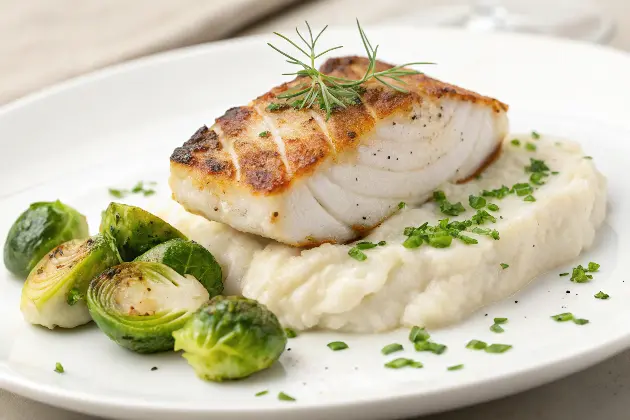Easy 7-Day 1400 Calorie Meal Plan | High in Protein
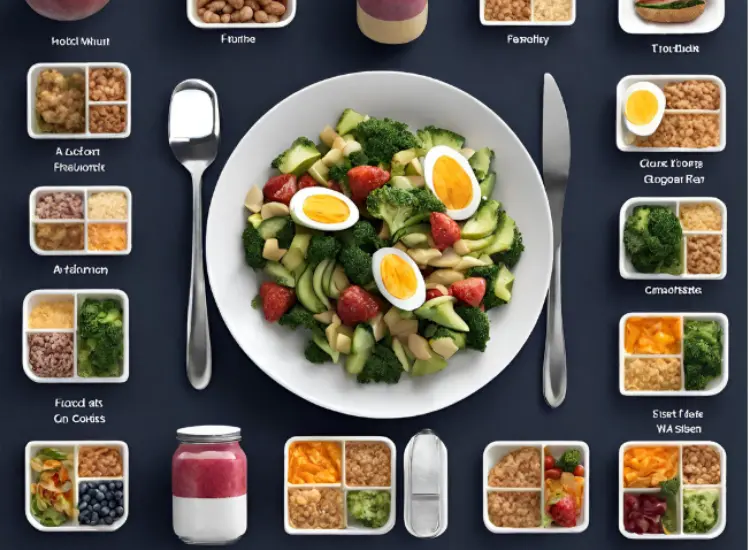
What is a 1400 Calorie Meal Plan?
This post may contain affiliate links, meaning I may earn a commission if you make a purchase, at no extra cost to you. I only recommend products I trust. Thank you for your support.
A 1400 calorie meal plan is a structured eating plan designed to provide approximately 1400 calories per day.
A 1400 calorie diet typically used for weight management, weight loss, or when trying to maintain a specific calorie target.
This 1400 calorie meal plan features low carb high-protein meals that are carefully balanced to provide optimal nutrition.
This 1400 calorie diet plan focuses on a healthy mix of lean proteins, wholesome fats, and controlled carbohydrates, all while staying within the daily calorie limit to support weight management or weight loss goals.
Is 1400 Calories Enough?
Whether 1400 calories a day is enough for an individual depends on various factors such as age, gender, weight, height, activity level, and overall health.
For many people, 1400 calories may be considered a low calorie diet and may result in weight loss, especially for individuals with a smaller stature or those with a sedentary lifestyle.
However, it’s essential to ensure that these calories come from nutrient-dense foods to meet one’s nutritional needs.
7-Day 1400 Calorie Meal Plan (Weekly Menu)
A well-structured 7-day 1400 calorie meal plan is key to achieving your health and weight loss goals.
This 1400 calorie meal plan is expertly crafted to deliver a balanced, protein-rich diet to support your nutritional goals through a controlled calorie intake.
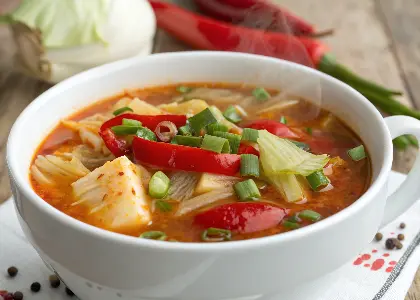
Day 1
Breakfast (150 calories):
- Spinach & Egg Scramble with Raspberries: Fluffy scrambled eggs with spinach, topped with cheddar, served with raspberries. (1 serving, 1 Tbsp. shredded cheddar cheese to top eggs)
Lunch (425 calories):
- Vegan Superfood Grain Bowl: Chickpeas, greens, and veggies over broth, drizzled with lemon tahini dressing. (2 cups water or vegetable broth, 3 oz chickpeas, 1 Tbsp. olive oil, 2 cups mixed greens, 1 cup cherry tomatoes, 1/2 cucumber, 1/4 cup red onion, 1/4 cup shredded carrots, lemon tahini dressing)
Dinner (455 calories):
- Spicy Weight-Loss Cabbage Soup: Cabbage, carrots, and bell pepper simmered in spiced broth with tomatoes. (1 Tbsp. olive oil, 3 minced garlic cloves, 1/2 tsp red pepper flakes, 1 tsp paprika and ground cumin, 1/2 head cabbage, 2 diced carrots, 1 diced bell pepper, 4 cups vegetable broth, 8 oz diced tomatoes)
Snacks (370 calories):
- Hummus with Carrot Sticks: Creamy hummus with crunchy carrot sticks. (1/4 cup hummus, 2 medium carrots, cut into sticks)
- Greek Yogurt with Raspberries and Almonds: Yogurt with fresh raspberries and crunchy almonds. (1/2 cup Greek yogurt, 1/2 cup raspberries, 2 Tbsp. almonds)
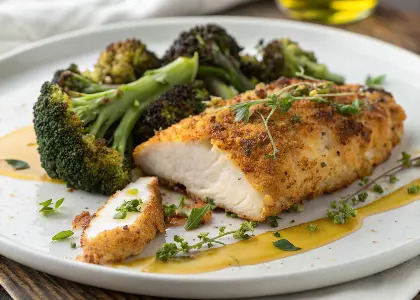
Day 2
Breakfast (240 calories):
- All-Bran Cereal with Skim Milk and Raspberries: High-fiber cereal with skim milk and sweet raspberries. (1 cup All-Bran cereal, 1 cup skim milk, 1/2 cup raspberries)
Lunch (220 calories):
- Turkey and Veggie Wrap: Sliced turkey with crisp veggies and mustard in a whole wheat wrap. (1 whole wheat wrap, 3 oz. sliced turkey breast, lettuce, tomato, cucumber, mustard)
Dinner (623 calories):
- Hummus-Crusted Chicken with Roasted Broccoli: Chicken baked with hummus and spices, served with roasted broccoli. (3 boneless, skinless chicken breasts, 1/4 cup hummus, 1 Tbsp. olive oil, 2 cloves garlic, 1 tsp paprika, 1/2 tsp salt, 1/4 tsp black pepper, 1 cup broccoli florets, lemon garlic vinaigrette)
Snacks (320 calories):
- Cheddar Cheese and Apple: Sharp cheddar paired with a crisp, juicy apple. (1/2 oz. Cheddar cheese, 1 medium apple)
- Cottage Cheese with Pineapple: Creamy cottage cheese topped with sweet pineapple chunks. (1/2 cup cottage cheese, 1/2 cup pineapple chunks)
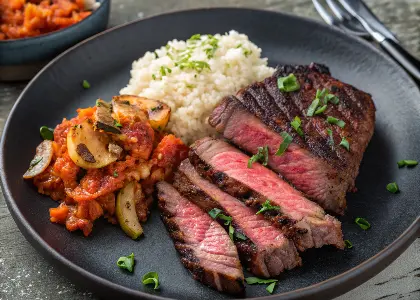
Day 3
Breakfast (210 calories):
- Avocado Toast with Scrambled Eggs: Whole-grain toast topped with creamy avocado and fluffy scrambled eggs. (1 slice whole-grain toast, 1/4 avocado, 1 egg)
Lunch (425 calories):
- Vegan Superfood Grain Bowl: A hearty mix of chickpeas, greens, and veggies dressed in lemon tahini. (2 cups water or vegetable broth, 3 oz chickpeas, 1 Tbsp. olive oil, 2 cups mixed greens, 1 cup cherry tomatoes, 1/2 cucumber, 1/4 cup red onion, 1/4 cup shredded carrots, lemon tahini dressing)
Dinner (538 calories):
- Gochujang Steak, Kimchi & Cauliflower Rice Bowl: Spicy marinated steak served with tangy kimchi and cauliflower rice. (1/2 lb flank or sirloin steak, 2 Tbsp. gochujang sauce, 2 Tbsp. soy sauce, 2 cloves garlic, 1/2 Tbsp. sesame oil, 1 cup kimchi, 1/2 head cauliflower)
Snacks (230 calories):
- Hard-Boiled Egg with Hot Sauce: Simple and protein-packed with a kick of heat. (1 hard-boiled egg, hot sauce)
- Almonds and Apple: Crunchy almonds paired with a fresh apple for a sweet and salty combo. (10 almonds, 1 medium apple)
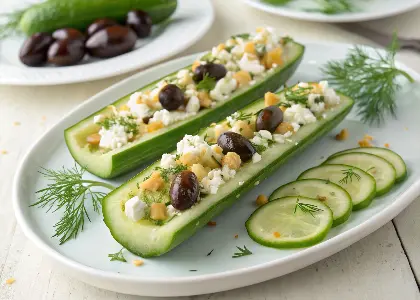
Day 4
Breakfast (320 calories):
- Morning Salmon Salad: Toast with cream cheese, smoked salmon, and chives, served with Greek yogurt. (1 toast slice, 1 Tbsp. cream cheese, 1 cup nonfat Greek yogurt, 1.5 oz Atlantic salmon, 1 tsp chopped chives, 1/2 dash pepper)
Lunch (355 calories):
- Mango Protein Shake & Feta Cucumber Boats: A tropical protein shake paired with refreshing cucumber boats stuffed with feta. (1/2 cup sliced mangoes, 1 cup reduced-fat milk, 1 Tbsp. honey, 30g whey protein powder)
Dinner (360 calories):
- Grilled Vegetable Salad with Chicken: A hearty salad with grilled veggies, lean chicken breast, and tangy balsamic vinaigrette. (2 cups mixed grilled vegetables, 4 oz grilled chicken breast, balsamic vinaigrette dressing)
Snacks (371 calories):
- Rice Cakes with Almond Butter: Light rice cakes topped with creamy almond butter. (2 rice cakes, 2 Tbsp. almond butter)
- Cottage Cheese & Apricots: A sweet and protein-rich combo. (1 cup cottage cheese, 1/4 cup dried apricot halves)
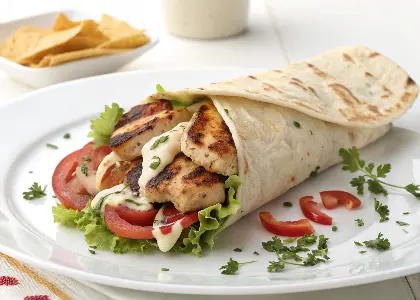
Day 5
Breakfast (210 calories):
- Egg Salad Avocado Toast: Creamy avocado and chopped egg atop a slice of whole grain toast. (1 hard-boiled egg, 1/4 ripe avocado, 1 slice whole grain bread)
Lunch (528 calories):
- Grilled Chicken Wrap: A whole-wheat wrap filled with juicy grilled chicken, crunchy lettuce, fresh tomato slices, shredded carrots, and creamy hummus. (1 whole wheat wrap, 4 oz grilled chicken breast, 1/4 avocado sliced, 1/2 cup shredded lettuce, 1/4 cup diced tomatoes, 1/4 cup shredded carrots, 2 Tbsp. hummus, 1 Tbsp. crumbled feta cheese)
Dinner (460 calories):
- Taco Spaghetti Squash Boats: A low-carb taco-inspired dish with seasoned meat, veggies, and cheese served in spaghetti squash. (1/4 spaghetti squash, 1/8 lb ground beef or turkey, 1/2 cup diced bell peppers, 1/2 cup diced onion, 1/4 cup canned black beans, 1/4 cup shredded cheese, 1/2 cup corn kernels)
Snacks (207 calories):
- Cottage Cheese with Peaches: Sweet and creamy combo of peaches and cottage cheese. (1/2 cup cottage cheese, 1/2 cup sliced peaches)
- Cherry Tomatoes with Mozzarella: Fresh tomatoes paired with a bit of mozzarella for a light bite. (1 cup cherry tomatoes, 1/2 oz. mozzarella cheese)
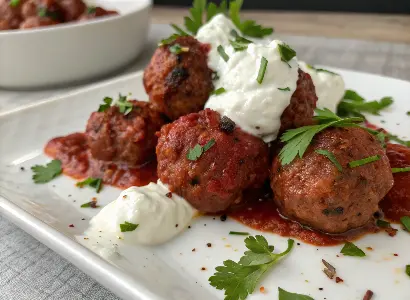
Day 6
Breakfast (225 calories):
- Peanut Butter Banana Toast: A satisfying slice of whole grain toast topped with creamy peanut butter and sweet banana slices. (1 slice whole grain toast, 1 Tbsp. peanut butter, 1/2 sliced banana)
Lunch (490 calories):
- Harissa Meatballs with Whipped Feta: Spiced harissa meatballs served over a bed of greens and grains, paired with creamy whipped feta. (4 small beef or turkey meatballs mixed with harissa seasoning, 1/2 cup cooked couscous or quinoa, 1/4 cup whipped feta, 1/2 cup roasted veggies like zucchini or bell pepper, 1 tsp olive oil)
Dinner (389 calories):
- Grilled Shrimp with Quinoa and Steamed Broccoli: Juicy shrimp grilled to perfection, served with fluffy quinoa and crisp steamed broccoli. (4 oz. grilled shrimp, 1 cup cooked quinoa, 1 cup steamed broccoli)
Snacks (300 calories):
- Mixed Nuts: A crunchy, satisfying handful of healthy fats and protein. (1/4 cup mixed nuts)
- Banana with Almond Butter: Naturally sweet banana paired with rich almond butter for a quick energy boost. (1 medium banana, 1 Tbsp. almond butter)
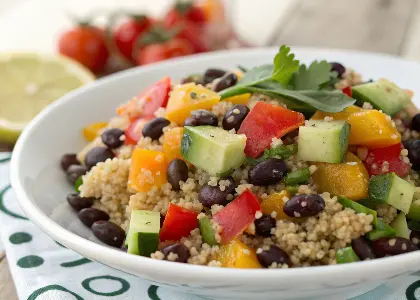
Day 7
Breakfast (240 calories):
- Chia Seed Pudding with Almond Milk: Creamy chia pudding paired with almond milk and sweet strawberries. (1/2 cup chia seed pudding, 1 cup almond milk, 1/2 cup strawberries)
Lunch (570 calories):
- Quinoa and Black Bean Salad with Avocado & Lime Cilantro Dressing: A refreshing salad of quinoa and black beans topped with creamy avocado and tangy lime cilantro dressing. (1 cup cooked quinoa, 1/4 cup black beans, 1/2 avocado, 2 Tbsp lime cilantro dressing)
Dinner (345 calories):
- Baked Tilapia with Steamed Broccoli & Brown Rice: Light and flaky tilapia fillet served with tender broccoli and hearty brown rice. (6 oz. baked tilapia, 1 cup steamed broccoli, 1/2 cup cooked brown rice)
Snacks (250 calories):
- Greek Yogurt with Blueberries: Protein-packed yogurt with juicy blueberries. (1/2 cup Greek yogurt, 1/4 cup blueberries)
- Sliced Cucumber with Hummus: A crunchy and creamy snack combo. (1/2 cucumber, 1/4 cup hummus)
Foods to Include in a 1400 calorie meal plan
Here are some nutrient-dense foods that can be included in a 1400 calorie meal plan.
Including a variety of these foods in appropriate portion sizes can help ensure that a 1400 calorie diet remains balanced and provides essential nutrients.
1. Lean Proteins
- Chicken breast
- Turkey breast
- Fish (salmon, tuna, trout)
- Lean cuts of beef or pork
- Tofu or tempeh for plant-based options
2. Healthy Fats
- Avocado
- Nuts and seeds (almonds, chia seeds, flaxseeds)
- Olive oil
- Fatty fish (salmon, mackerel)
3. Whole Grains
- Quinoa
- Brown rice
- Oats
- Barley
4. Fruits
- Berries (strawberries, blueberries, raspberries)
- Apples
- Bananas
- Oranges
5. Vegetables
- Leafy greens (spinach, kale, Swiss chard)
- Cruciferous vegetables (broccoli, cauliflower, Brussels sprouts)
- Bell peppers
- Carrots
6. Dairy Alternatives
- Greek yogurt
- Cottage cheese
- Almond milk, soy milk, or other fortified plant-based milks
7. Legumes
- Lentils
- Chickpeas
- Black beans
- Edamame
8. Healthy Snacks
- Hard-boiled eggs
- Hummus with raw vegetables
- Air-popped popcorn
- Nut butter with whole grain crackers
Foods to Avoid in a 1400 Calorie Meal Plan
In a 1400 calorie meal plan, it’s important to be mindful of food choices to ensure that the calories are utilized for nutrient-dense, satisfying options.
Here are some foods to consider avoiding or consuming in moderation:
1. Highly Processed Foods
- Foods high in added sugars
- Refined flours
- Unhealthy fats, such as sugary cereals, pastries, and certain packaged snacks.
2. Sweetened Beverages
- Sodas
- Sweetened iced tea
- Energy drinks
- Sugary fruit juices
3. High Fat, High Calorie Snacks
- Potato chips
- Fried snacks
- Granola bars
- High calorie dips and spreads.
4. Sugary Treats
- Candies
- Chocolates
- Other high sugar desserts.
5. Fried Foods
- French fries
- Fried chicken
6. Sauces and Condiments High in Calories:
- Mayonnaise
- Creamy salad dressings
- Sweetened barbecue sauces
7. Excessive Alcohol
- Alcoholic beverages can contribute to calorie intake without providing nutritional benefits, so it’s important to consume them in moderation or limit intake.
Benefits of a 1400 Calorie Meal Plan High Protein
A 1400-calorie meal plan high in protein offers several benefits:
- Supports Muscle Maintenance and Growth: Protein is essential for building and repairing muscle tissue. A higher protein intake helps maintain muscle mass, especially during weight loss.
- Promotes Satiety: Protein helps you feel full longer, reducing hunger and cravings, which makes it easier to stick to your calorie limit and avoid overeating.
- Boosts Metabolism: Protein requires more energy to digest than fats or carbs (known as the thermic effect of food), which can help increase calorie burn.
- Helps with Fat Loss: By preserving muscle mass and increasing metabolism, a high-protein diet supports fat loss, helping you achieve a leaner body composition.
- Improves Nutrient Quality: Protein-rich foods often contain other essential nutrients like vitamins, minerals, and healthy fats, contributing to a well-rounded, nutrient-dense diet.
- Better Blood Sugar Control: A higher protein intake can help stabilize blood sugar levels by slowing down the digestion of carbohydrates, preventing spikes in insulin.
1400 Calorie Diet Tips
Here are some tips for following a 1400 calorie diet:
- Focus on Protein: Include lean proteins like chicken, fish, and legumes to keep you feeling full longer.
- Control Carbs: Opt for whole grains, vegetables, and fruits in moderation to manage carbohydrate intake.
- Healthy Fats: Incorporate healthy fats like avocado, olive oil, and nuts to support overall health.
- Meal Prep: Plan and prepare meals in advance to avoid overeating or unhealthy choices.
- Portion Control: Use smaller plates and measure portions to stay within the calorie limit.
- Stay Hydrated: Drink plenty of water throughout the day to support metabolism and manage hunger.
- Snack Wisely: Choose nutrient-dense snacks like Greek yogurt, vegetables, or a handful of nuts.
Conclusion
A 7-day, 1400 calorie meal plan can be an effective tool for weight loss and overall health improvement.
By incorporating high protein options into your meals and snacks, you can ensure adequate nourishment while keeping hunger at bay.
Additionally, prioritizing high-protein options can support satiety, muscle maintenance, and metabolic health.
It’s important to personalize the 1400 calorie meal plan high protein to individual preferences and dietary requirements while seeking guidance from a healthcare professional or registered dietitian for tailored advice.
With careful planning and a focus on wholesome, satisfying foods, a 1400 calorie meal plan can contribute to a healthy and sustainable approach to nutrition.
In conclusion, a well-structured 7-day, 1400 calorie meal plan can provide a balanced approach to healthy eating, offering a variety of nutrient-dense foods to support overall well-being.
Additionally, check out these other meal plans which help with weight loss and digestive health:
- 1600 calorie meal plan for weight loss
- 7-day bone broth diet plan
- 7-day diet plan for high blood pressure
- Carnivore diet meal plan for weight loss
- Low FODMAP meal plan
- 7-day meal plan for gastritis
- 7-day meal plan for gestational diabetes
- South beach diet for weight loss
- Ice hack for weight loss
- Gluten free meal plan
- Crohn’s disease diet plan
- 7-day meal plan for kidney disease
- 7-day meal plan for elderly
- 1200 calorie meal plan for beginners
Frequently Asked Questions (FAQs)
What is a 1400 calorie diet?
A 1400 calorie diet is a meal plan designed to provide around 1400 calories per day. It typically emphasizes portion control and includes a balance of macronutrients such as lean proteins, healthy fats, complex carbohydrates, and a variety of fruits and vegetables.
What are the benefits of a high protein meal plan?
A high protein meal plan can aid in weight loss, promote muscle growth and repair, improve bone health, and enhance blood sugar control.
Can I lose weight by eating 1400 calories a day?
Losing weight is possible with 1400 calories a day intake, as it often creates a calorie deficit for many individuals. However, the effectiveness of this calorie level for weight loss can vary based on factors such as a person’s age, gender, activity level, and individual metabolism.
Is 1400 a good amount of calories?
The ideal number of calories for an individual depends on various factors such as age, gender, activity level, metabolic rate, and overall health goals. For some individuals, 1400 calories may be appropriate for weight management or weight loss, while for others, it may not provide sufficient energy to support their daily needs.
How to stick to 1400 calories a day?
To stick to a 1400 calorie a day limit, consider meal planning, portion control, choosing nutrient-dense foods, staying hydrated, incorporating regular physical activity, and seeking support from friends or online communities to stay motivated and accountable.
